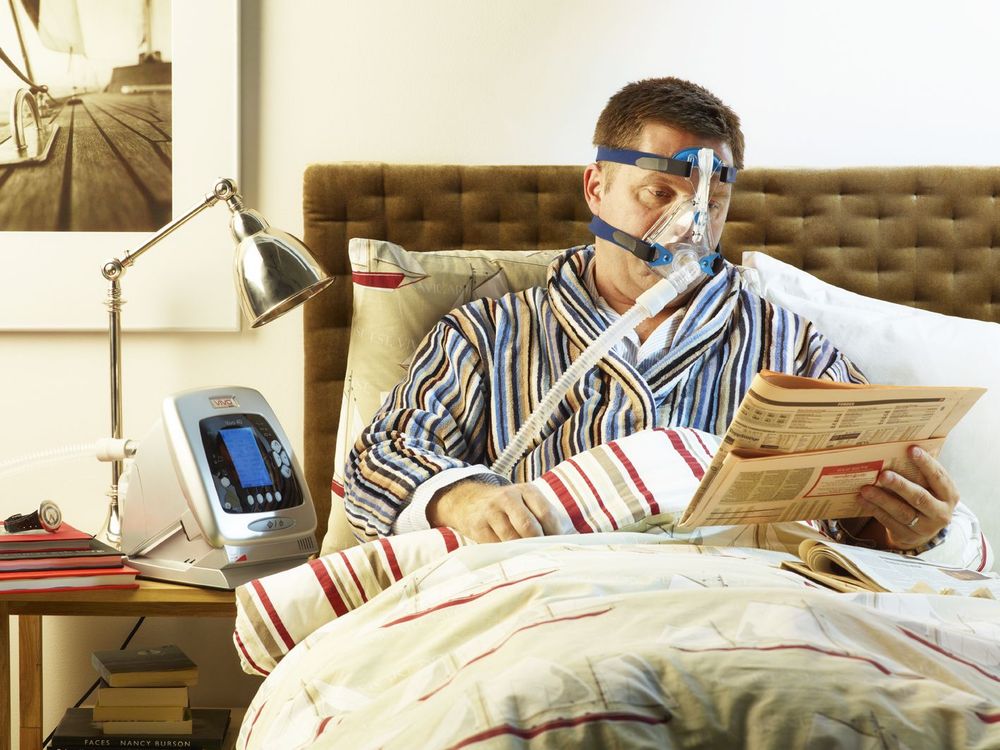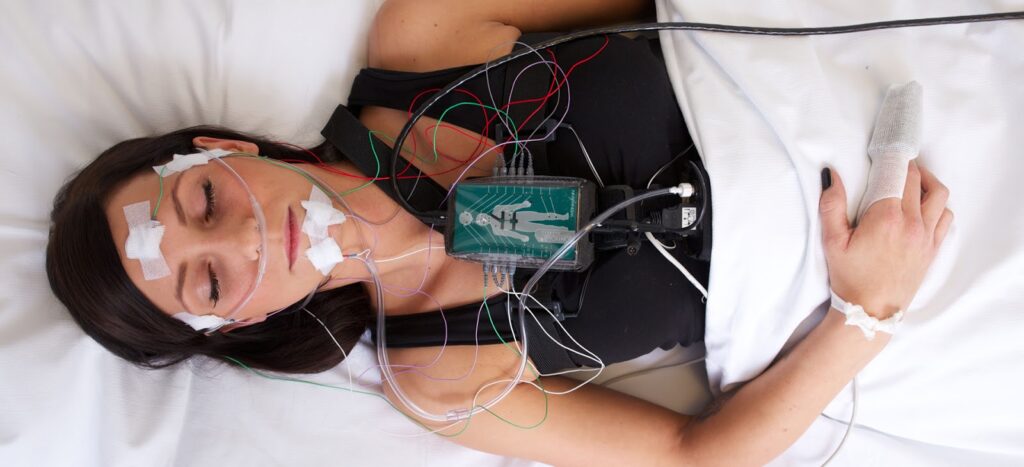

More than 22 million Americans suffer from sleep apnea, with snoring being the most common symptom. During sleep apnea, your breathing is interrupted repeatedly for a brief period. There are two major types of this condition; central sleep apnea (CSA) and obstructive sleep apnea (OSA). When this sleep disorder presents itself in both forms, it is referred to as complex sleep apnea. Sleep apnea may predispose you to high blood pressure, Type 2 diabetes, and liver problems.
But can you die from sleep apnea? Read on to find out more information about this topic.
Sleep apnea is a sleep disorder that causes a person to start and stop breathing during the night frequently. It can occur multiple times in an hour and affect the proper functioning of the brain, heart, and lungs in severe cases.
Although sleep apnea death is uncommon, it is important to learn the common symptoms to be able to treat this disorder before it causes or worsens health issues.
The typical symptoms of sleep apnea include:
In a global statistics study Trusted Source Estimation of the global prevalence and burden of obstructive sleep apnoea: a literature-based analysis | PubMed | NCBI There is a scarcity of published data on the global prevalence of obstructive sleep apnoea, a disorder associated with major neurocognitive and cardiovascular sequelae. pubmed.ncbi.nlm.nih.gov , researchers found that almost 1 billion people are affected by obstructive sleep apnea and that the prevalence rate was more than half the population in some countries. You don’t necessarily die in your sleep from sleep apnea, but the emerging issues from this disorder could significantly increase the death risk if it is not treated. Some studies report that individuals with sleep apnea, especially elderly people who are above 60 years old, are thrice as likely to die from cardiac arrest and other complications associated with sleep apnea. The disorder is a complicating factor in sleep apnea death because it raises blood pressure, strains the cardiovascular system, and disrupts normal brain, lung, and heart function.
A report by American Heart Association Trusted Source What you need to know about how sleep apnea affects your heart | American Heart Association Snoring can keep you awake, ruin your sleep cycle and your daily rhythm, even harm your relationships. But more than being just an annoyance, snoring may bring about life-threatening consequences. www.heart.org indicates that 1 in 5 adults have some form of sleep apnea, and the condition affects more men than women. Do people die from sleep apnea? Cardiac death risk increases by 80% if the blood oxygen levels are lower than 78%, and since sleep apnea causes sudden drops in blood oxygen levels, the effects can be fatal.
This type of sleep apnea happens when the brain fails to send the right signals to the diaphragm, the muscles responsible for breath control and proper airflow. This causes the person to take shallow breaths while asleep or to cease breathing for a short duration lasting approximately 10 to 40 seconds.
During normal breathing, the brain sends a signal to the phrenic nerve and then to the breathing muscle to contract at consistent intervals to draw air into the lungs.
Some risk factors for central sleep apnea include congestive heart failure, exposure to high altitude, increased amount of arousals during Positive Airway Pressure (PAP) therapy, and disrupted breathing patterns from using certain medications such as opioids.
Note that CPAP therapy is used to treat central sleep apnea, and the symptoms improve over time. Bi-level positive airway pressure (BiPAP) therapy machine may be costlier, but it is preferable for home use and for lower air pressure during exhalation.

Can you die from central sleep apnea? Although it is not common, this condition can affect your health negatively in the long term if it is not treated. Central sleep apnea causes fatigue, sleep disturbance, racing heartbeat, daytime sleepiness, or even heart failure, increasing death risk.
This is the most common form of sleep apnea. During obstructive sleep apnea, the airway becomes narrow or blocked, and the person ceases to breathe multiple times while asleep. This disrupts sleep and causes snoring, headaches, fatigue, and poor concentration during the daytime. The disorder is commonly found in people who are overweight.
Can you die from obstructive sleep apnea? Usually, the nervous system will detect obstructive sleep apnea and slightly awaken the person to resume breathing. If the condition remains untreated, it may increase the risk of stroke and heart attacks because lowering the oxygen level repeatedly can stress and damage the cardiovascular system after a while.
Your doctor may recommend continuous positive airway pressure therapy (CPAP) or an oral device to wear at night to treat obstructive sleep apnea.
There are people who die from sleep apnea, but it is often due to the complications resulting from the disorder itself rather than sleep apnea itself. The reason you may not die in your sleep from sleep apnea is that once the brain detects low oxygen blood levels from disrupted or paused breathing, it triggers the body to wake up. This opens the airways, and the person resumes breathing.

You could also invest in the best pillow for sleep apnea like the Relax Home Life Wedge Pillow that will clear the airway and promote proper breathing while asleep.
Can sleep apnea kill you? Yes, but rarely. However, it makes a person susceptible to a lot of health issues. Some of these health risks are what heightens the chances of death. We will discuss some common health risks associated with sleep apnea:
Heart failure and high blood pressure are likely to occur in individuals with sleep apnea because the cessation of breathing multiple times at night results in frequent sudden drops of oxygen levels in the blood. This raises blood pressure, stresses the cardiovascular system, and increases the risk of abnormal heartbeats, stroke, or a heart attack.
Disrupted sleep will limit your body’s restorative ability from a rejuvenating sleep and make you feel tired, be irritable or have trouble focusing during the day.
This causes poor performance at school or work, and activities such as driving in this condition can be dangerous.
Obesity and advanced age are the most common factors that can affect the metabolism of glucose when your body develops insulin resistance. Sleep apnea is also a risk factor for type 2 diabetes.
Sleep apnea puts you at a higher risk of abnormal liver tests such as nonalcoholic fatty liver disease, which causes scarring.
Some experts suggest that individuals with MS may also have sleep apnea because of cardiovascular and metabolic complications such as high blood sugar and hypertension.
Anesthesia, certain medication, or major surgery can make you die from severe sleep apnea breathing issues. It is essential to inform the doctor of any sleep apnea condition you may have prior to surgery so they can choose treatment for you that will not be problematic or fatal.

The correct treatment will depend on the diagnosis after your doctor has checked your symptoms.
Polysomnography is a type of sleep test that diagnoses sleep disorders by monitoring brain activity, heart rate, blood oxygen levels, breathing, and movements of the eyes and legs. You could also purchase ResMed AirSense 10 AutoSet CPAP that is specifically designed for women to detect sleep apnea.
Since you can die from severe sleep apnea, it is important to consult a doctor if the condition becomes serious about preventing further health complications that increase the risk of death.
Continuous positive airway pressure (CPAP) therapy is one of the most common treatments for sleep apnea. A machine provides compressed air into the nose or mouth through a full-face CPAP mask. You can take the portable machine with you anywhere along with this FAA-compliant Medistrom CPAP battery as a backup power source.
There are also oral devices that keep the throat open for proper airflow.
If you look at the statistics we have included in this article, you will realize that sleep apnea affects a substantial number of individuals. Obstructive sleep apnea is the most common kind, and the symptoms include heavy snoring and waking up suddenly gasping or choking during the night. You can treat the condition in mild situations by changing your sleeping position or switching to a pillow designed to prevent sleep apnea.
So, can you die from sleep apnea? Severe sleep apnea may require medical consultation before it causes serious health complications such as hypertension, liver problems, and cardiac arrest, which heighten death risk. Your doctor may recommend a mandibular advancement device (MAD) or continuous positive airway pressure (CPAP) therapy to treat sleep apnea.